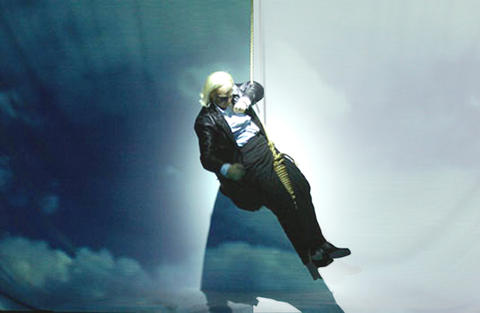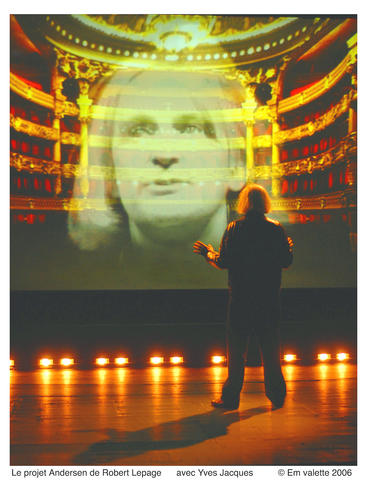Fairytales have an image of lightness and goodness. Many have their dark sides, however, and, as it turns out, so do their creators.
Denmark decided to mark the 200th anniversary of the birth of one of its most famous sons, Hans Christian Anderson, in 2005 by commissioning a variety of works and events to celebrate the writer's life and work. Among those tapped by the Danish Ministry of Culture was Canadian theater director/actor/writer Robert Lepage.
It could have been a straight forward biography. But Lepage took a decidedly unconventional approach to both his subject matter and the actual play, which will come as no surprise to those who are familiar with his previous shows, such as The Dragon's Trilogy and The Far Side of the Moon, which have captivated audiences both in his home base of Quebec and arts festivals from Sydney to Edinburgh.

Pphotos: courtesy of ntch
Lepage performed in the original production for more than a year, before handing the role over to a frequent collaborator and fellow Canadian, Yves Jacques, who will be performing here next week, fresh from performances in Seoul.
While The Anderson Project is called a one-man show, it is a far cry from a solo performance, for Lepage and his Ex Machina collective have used the latest technology - and a large dose of magic - to created a multi-media, time-shifting world for his characters and the audience to explore over the course of two hours. The settings range from the inside of an opera house and a park to a sex shop (more about that later) and the 1867 World's Fair in Paris.
For the script, Lepage drew on two of Anderson's tales - The Dryad and The Shadow - as well as his account of his trip to France to visit the World's Fair and other writings from Anderson's diaries and biographies. Lepage has said in interviews that he was interested to discover from Anderson's diaries that the man who crafted such exquisite children's tales and is still seen by the Danish as the embodiment of celibate purity was obsessed with masturbation (which is where the sex shop comes in).

Photos: courtesy of ntch
The Anderson Project raises questions about sexual identity, unfulfilled fantasies, the thirst for fame and confronting the past. It is also the story about failure, a project that is never completed.
The play begins with a young Canadian writer who has been invited to Paris to write the libretto for a children's opera based on an Anderson fairy tale. There are four main characters: the Canadian writer, Hans Christian Anderson, a sex-obsessed opera house bureaucrat and a Moroccan immigrant who works as a janitor in Paris. Jacques plays all four - and more - effortlessly (apparently) morphing from one to the other and back again.
The 51-year old classically trained actor has been well known to Quebec theater audiences and Canadian TV viewers for many years. He began to make his mark internationally in the early 1990s, and has appeared in The Barbarian Invasions, Aurore and The Aviator.
While technically astounding, both in terms of the audio-visuals and the acting, The Anderson Project retains a sense of romance and wonder that is at the heart of Anderson's fairy-tale world.

May 18 to May 24 Pastor Yang Hsu’s (楊煦) congregation was shocked upon seeing the land he chose to build his orphanage. It was surrounded by mountains on three sides, and the only way to access it was to cross a river by foot. The soil was poor due to runoff, and large rocks strewn across the plot prevented much from growing. In addition, there was no running water or electricity. But it was all Yang could afford. He and his Indigenous Atayal wife Lin Feng-ying (林鳳英) had already been caring for 24 orphans in their home, and they were in

On May 2, Chinese Nationalist Party (KMT) Chairman Eric Chu (朱立倫), at a meeting in support of Taipei city councilors at party headquarters, compared President William Lai (賴清德) to Hitler. Chu claimed that unlike any other democracy worldwide in history, no other leader was rooting out opposing parties like Lai and the Democratic Progressive Party (DPP). That his statements are wildly inaccurate was not the point. It was a rallying cry, not a history lesson. This was intentional to provoke the international diplomatic community into a response, which was promptly provided. Both the German and Israeli offices issued statements on Facebook

President William Lai (賴清德) yesterday delivered an address marking the first anniversary of his presidency. In the speech, Lai affirmed Taiwan’s global role in technology, trade and security. He announced economic and national security initiatives, and emphasized democratic values and cross-party cooperation. The following is the full text of his speech: Yesterday, outside of Beida Elementary School in New Taipei City’s Sanxia District (三峽), there was a major traffic accident that, sadly, claimed several lives and resulted in multiple injuries. The Executive Yuan immediately formed a task force, and last night I personally visited the victims in hospital. Central government agencies and the

Australia’s ABC last week published a piece on the recall campaign. The article emphasized the divisions in Taiwanese society and blamed the recall for worsening them. It quotes a supporter of the Taiwan People’s Party (TPP) as saying “I’m 43 years old, born and raised here, and I’ve never seen the country this divided in my entire life.” Apparently, as an adult, she slept through the post-election violence in 2000 and 2004 by the Chinese Nationalist Party (KMT), the veiled coup threats by the military when Chen Shui-bian (陳水扁) became president, the 2006 Red Shirt protests against him ginned up by